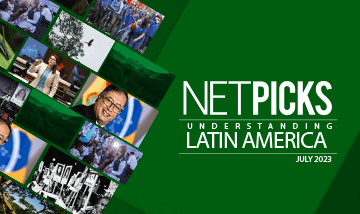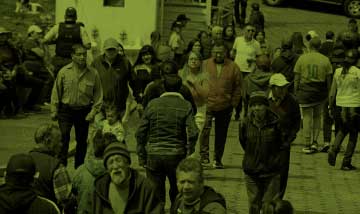Índice
Understanding Latin America
Dear readers and colleagues,
This month we bring you our monthly picks as usual, but we start by presenting another exclusive article by the Rosa Luxemburg Foundation’s Andean Regional Office. This special report takes an in depth look at the referendum facing the Yasuni National Park in Ecuador’s Amazon rainforest, when citizens will vote on whether or not to continue oil drilling in the park. What are the implications if drilling is allowed to continue? Here we tell you.
The other four articles we recommend this month are from Ecuador, Uruguay with it an exclusive article from Buenos Aires’ Office, Guatemala, and Colombia.
THE FUTURE OF YASUNI’S PETROLEUM WILL BE DECIDED AT THE POLLS
In August, Ecuadorians will head to the polls for a very important vote. Not only will they elect a new president and national assembly, they will also decide on the fate of the Yasuni National Park in Ecuador’s Amazon rainforest. Yasuni is considered one of the most biodiverse areas on the planet, but it also has some of the country’s most important oil reserves, which the state says is an important source of income. Environmental activists have been fighting for nearly 10 years for this referendum to happen, in order to allow citizens to decide whether the country should preserve the park and keep oil reserves indefinitely underground, or not. This year, the Constitutional Court finally approved the referendum, which will coincide with the presidential elections on August 20th. The YASunidos collective has faced numerous legal impediments and political pressure from Ecuador’s governments between 2013 and 2023, trying to make this vote happen. But even before that, the concept of keeping oil in the ground in Yasuni began in the 1990s. Here, the author reflects on this history, saying it’s important to understand what’s at stake, both for Ecuador and the planet.
Franklin Vega, July 3, 2023
https://www.rosalux.org.ec/the-future-of-yasunis-oil/
ECUADOR’S DIVIDED ELECTORAL LANDSCAPE
Political campaigning has been in full swing in Ecuador, since President Guillermo Lasso dissolved the government last month in a move known as muerte cruzada, or cross death. Eight candidates registered for the presidential race, and although there are some familiar faces, new political parties and alliances have been formed, reflecting Ecuador’s malleable party system. Here, the author takes a look at the more popular left-leaning candidates, and some of the dynamics that divide them. Former President Rafael Correa’s socialist party Revolución Ciudadana, or Citizens’ Revolution, is once again one of the stronger political parties in the country. They put forward as their presidential candidate former congressional deputy Luisa Gonzalez, a long-time Correista loyalist. Then there is Yaku Perez, who finished third place in the last presidential elections in 2021, when he ran as candidate for the Indigenous party Pachakutik. He has since started his own political party called Agua (Water), and this year he is running as part of the progressive coalition Claro Que Se Puede (Yes you can). Despite the popularity of the left candidates in previous elections, Ecuador is in a drastically different place than it was two years ago. How has the country changed under Lasso’s government, and how might this influence the upcoming elections?
Marc Becker, June 16, 2023
https://nacla.org/ecuadors-divided-electoral-landscape
REMEMBERING THE URUGUAYAN COUP
On June 27, 1973 Uruguayan President Juan María Bordaberry dissolved Parliament with the support of the Armed Forced, formally putting into motion a civic-military dictatorship that lasted until 1985. This year marked 50 years since the coup d´état, which the authors argue still have remnants in Uruguayan politics and society today. Throughout the dictatorship, torture and prolonged mass political imprisonment were the main forms of repression. Some 10,000 people were confined to prison in the first three years of civic-military rule alone, 197 people were detained or disappeared, often held and tortured in neighboring countries, and some 380,000 people went into exile. The leadership of the Marxist urban guerrillas Tupamaros National Liberation Movement (MLN-T) was also eliminated, and the organization’s operations broken up. The 15-years following the dictatorship, there was blanket forgetting, silencing or flat-out negating of the atrocities committed by those in power. This continued until the 1990s, when human rights organizations, labor and student unions, and radical left movements forced the state to confront the truth, and the left-wing government of Frente Amplio made significant headway in uncovering the realities during Uruguay’s dark period. In recent years, however, some right wing politicians have gone back to negating the atrocities. Can the country rectify this dark history?
Azul Cordo & Mauro Tomasini, June 27, 2023
https://www.rosalux.de/en/news/id/50637/remembering-the-uruguayan-coup
ARÉVALO BREAKS INTO PRESIDENTIAL RUNOFF FOR CENTER-LEFT SURPRISE IN GUATEMALA
The results of Guatemala’s June 25th Presidential elections, shocked many in the country’s political scene, as social-democrat Bernardo Arévalo of the Semilla, or Seed, party came in second place (12 percent of the vote). He and his running mate Karin Herrera, a biology professor from the country’s public university, will now move forward to the second round of elections, heading off against first lady Sandra Torres of the National Unity of Hope (UNE) party, who came in first place (15 percent of the vote). The Semilla party was founded in 2017, in the spirit of the 2015 mass anti-corruption protests that ended with President Otto Pérez Molina and VP Roxana Baldetti’s imprisonment on customs fraud charges. Arévalo’s second place win is seen as a sign of shifting political tides and people’s strong desire for change in Guatemala. But citizens also voiced their rejection of the current political-electoral system in other ways, including the high null vote, 17.4 percent, and a 40.3 percent abstention rate. The second round of elections will be held August 20. For more context on the candidates and current state of rampant corruption and impunity in Guatemala, read Insight Crime’s coverage. Can the next president break these patterns, or are they bound to repeat them?
Roman Gressier, June 26, 2023
https://elfaro.net/en/202306/centroamerica/26908/Ar%C3%A9valo-Breaks-into-Presidential-Runoff-for-Center-Left-Surprise-in-Guatemala.htm
GROUP OF GLOBAL LEFIST LEADERS WARNS “SOFT COUP” IS UNDERWAY IN COLOMBIA
A group of global leftists signed a letter earlier this month warning that a “soft coup” is underway in Colombia, accusing the country’s opposition of trying to remove President Gustavo Petro and his key allies from power. The letter comes as Petro’s administration faces a series of struggles, including a recent bizarre scandal where his top aides resigned after it was revealed they used state resources to surveil a nanny they suspected of having stolen money. In another case, the Attorney General began investigating a senator in Petro´s party for slandering the police for critical comments he made about them in 2021. The group of leftists who signed the letter say the Colombian opposition is “deploying the combined institutional power of the country’s regulatory agencies, media conglomerates, and judiciary branch to halt [Petro’s] reforms, intimidate its supporters, topple its leadership, and defame its image on the international stage.” More than 400 international progressives signed the letter, including former Colombian President Ernesto Samper; former Ecuadorian President Rafael Correa; former Spanish President José Luis Rodríguez Zapatero; and the former heads of opposition parties around the world, including Jeremy Corbyn of the United Kingdom and Jean-Luc Mélenchon, a former French presidential candidate. Click bellow to read the letter in full.
Ryan Grim, June 7, 2023
https://theintercept.com/2023/06/07/colombia-gustavo-petro-letter/




